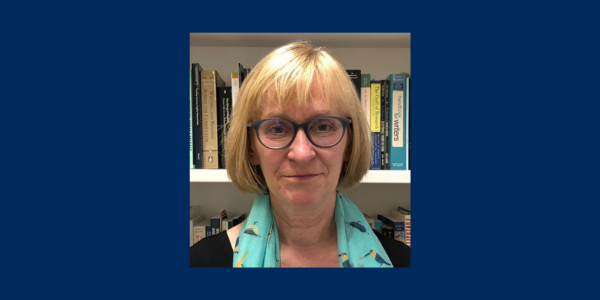GCAC’s Jane Freeman receives highest teaching honour at the University of Toronto

If you ask Professor Jane Freeman, she’ll tell you that much of her success as a teacher comes from her willingness to embrace failure. “The teachers I most admire are lifelong learners,” says Freeman, who has been teaching academic communication at the University of Toronto for over twenty years. “They enjoy learning alongside their students, they’re willing to try creative experiments, and they’re open to learning from failures as well as successes.”
Freeman is the recipient of a 2023 President’s Teaching Award, the highest teaching honour given at the University of Toronto. Founded in 2006, the award is presented annually to recognize superlative achievement in the areas of educational leadership, teaching excellence, and educational innovation.
Freeman joined the University in 2000 as the founding Director of the Graduate Centre for Academic Communication (GCAC), a unit within the School of Graduate Studies that offers advanced training in academic communication skills to graduate students. Last year she was promoted to the rank of Full Professor, Teaching Stream.
The centre, which began as the Office for English Language and Writing Support, was the first program in Canada designed specifically to address the academic communication needs of graduate students. Today, it serves thousands of graduate students from all disciplines across U of T’s three campuses, offering courses and workshops on topics like grant-writing, thesis-writing, oral presentation skills, editing your own work, and navigating the publishing process. In 2021-22, students from 80 graduate units at U of T registered over 20,000 times for GCAC’s programming.
In her role as GCAC’s Director, Freeman has designed many of the program’s courses and workshops as well as its unique modular structure, which comprises workshops (live and pre-recorded), three- to six-week courses, writing boot camps, and one-on-one appointments, all offered multiple times throughout the year.
The unit’s original modular design – which Freeman refers to as “language lego” – gives graduate students the flexibility to choose what they need, when they need it, while allowing the centre’s staff (teaching faculty, fifteen part-time course instructors and writing centre consultants, and a Program Coordinator) to meet the demand for support in a wide range of areas.
The program was awarded a Writing Program Certificate of Excellence from the National Council of Teachers of English (NCTE) and was chosen as one of five graduate communication models from around the world to be featured in the book, Supporting Graduate Student Writers: Research, Curriculum, and Program Design (2016).
Freeman has also been influential in the development of writing pedagogy beyond GCAC. She has worked with Writing Directors across the U of T’s 16 Writing Centres to increase the profile of writing pedagogy at the university and to organize annual professional development events for new and returning Writing Instructors. In 2019, recognizing the systemic inequity in access to awards for Writing Instructors, she helped establish U of T’s Margaret Procter Award for Excellence in Writing Instruction.
Despite her distinguished record as an educational leader, Freeman’s first passion continues to be teaching, where her pedagogy reflects a keen sensitivity to students’ needs. In her popular course on writing SSHRC grants, for instance, she is careful to share the first (or “worst”) drafts of winning proposals as well as the final versions so that students can see how writing improves with iteration. The course receives 150 to 200 students in most years, and to date, over 600 students who have taken the course have succeeded at winning major SSHRC grants.
Key to Freeman’s teaching philosophy is a rejection of prescriptivism. She notes that students from different cultural backgrounds, educational systems, and academic disciplines approach their work with distinct sets of cultural assumptions that shape their writing strategies.
“The more I learn from my sophisticated students, the more I see how my knowledge has been shaped by the teachers I’ve had, the schools I’ve gone to, and the cultural assumptions that have surrounded me,” says Freeman. “We don’t want to be ethnocentric and say, do it this way. We want to help students be aware of the assumptions that shape their choices and to empower them to make decisions in their current contexts.”
Although all of GCAC’s offerings are non-credit and optional, in the last five years, over 2700 graduate students have registered for Freeman’s courses, while over 5000 have registered for her workshops.
“We have grown used to thinking of teaching excellence in terms of undergraduate education, but graduate education is critical to U of T’s academic mission,” says Joshua Barker, Dean of the School of Graduate Studies and Vice-Provost, Graduate Research and Education. “I am delighted that we are recognizing teachers like Jane, whose extraordinary dedication touches thousands of graduate students every year.”
Freeman’s educational leadership extends beyond the U of T. A respected Shakespeare scholar and sought-after public speaker, she is the past Chair of the Stratford Shakespeare Festival’s Education and Archives Committee and its University Task Force, and the host of an annual Shakespeare Lecture Series at the Toronto Reference Library. She has published several peer-reviewed articles and book chapters related to graduate writing pedagogy and to Shakespeare.
